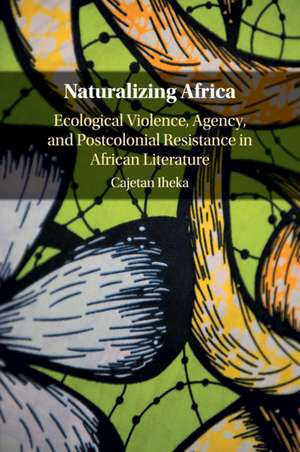Naturalizing Africa: Ecological Violence, Agency, and Postcolonial Resistance in African Literature
Autor Cajetan Ihekaen Limba Engleză Paperback – 29 mai 2019
| Toate formatele și edițiile | Preț | Express |
|---|---|---|
| Paperback (1) | 281.49 lei 6-8 săpt. | |
| Cambridge University Press – 29 mai 2019 | 281.49 lei 6-8 săpt. | |
| Hardback (1) | 690.80 lei 6-8 săpt. | |
| Cambridge University Press – 6 dec 2017 | 690.80 lei 6-8 săpt. |
Preț: 281.49 lei
Nou
Puncte Express: 422
Preț estimativ în valută:
53.87€ • 56.03$ • 44.47£
53.87€ • 56.03$ • 44.47£
Carte tipărită la comandă
Livrare economică 14-28 aprilie
Preluare comenzi: 021 569.72.76
Specificații
ISBN-13: 9781316648643
ISBN-10: 1316648648
Pagini: 223
Dimensiuni: 153 x 210 x 14 mm
Greutate: 0.3 kg
Editura: Cambridge University Press
Colecția Cambridge University Press
Locul publicării:Cambridge, United Kingdom
ISBN-10: 1316648648
Pagini: 223
Dimensiuni: 153 x 210 x 14 mm
Greutate: 0.3 kg
Editura: Cambridge University Press
Colecția Cambridge University Press
Locul publicării:Cambridge, United Kingdom
Cuprins
Introduction: naturalizing Africa; 1. African literature and the aesthetics of proximity; 2. Beyond human agency: Nuruddin Farah and Somalia's ecologies of war; 3. Rethinking postcolonial resistance: the Niger Delta example; 4. Resistance from the ground: agriculture, gender, and manual labor; Epilogue: rehabilitating the human.
Recenzii
'Naturalizing Africa is an essential addition to environmental studies in Africa. Iheka has an impressive command of the interface between human communities and non-human ecologies and the way literature can illuminate some of the most vital environmental challenges of our time.' Rob Nixon, Currie C. and Thomas A. Barron Family Professor in the Humanities and the Environment, Princeton University, New Jersey
'Through its focus on non-human agency and what Cajetan Iheka calls 'the proximity' of human and non-human actors, Naturalizing Africa offers an innovative approach to the role African literary studies can play in addressing environmental degradation and injustice in Africa. It represents an insightful and significant contribution to literary, postcolonial, and environmental studies.' Byron Santangelo, Professor of English, University of Kansas
'Cajetan Iheka delivers a beautifully researched referendum on the Eurocentric limitations of both Enlightenment and postcolonial thought, seeking to relocate African ecocriticism and environmental activism in a primarily indigenous African understanding of the relations of humans with non-humans. His delineation of an 'aesthetics of proximity' as a means of representing multispecies relationships adds yet another dimension to the most progressive scholarship in animal studies, ecocriticism, and the new materialism.' Stephanie LeMenager, Moore Endowed Professor, Department of English, University of Oregon
'Brilliantly countering the anthropocentrism of much ecocritical scholarship on African literatures, Cajetan Iheka's Naturalizing Africa offers important new interventions into African, postcolonial, and environmental studies. Through its skillful, expert analyses of literary representations of ecological crises from across the African continent, this book also contributes significantly to envisioning alternative, sustainable ecosystems.' Karen L. Thornber, Professor of Comparative Literature, Harvard University, Massachusetts
'Cajetan Iheka's Naturalizing Africa is an eloquent, theoretically sophisticated contribution to the growing body of ecocritical work engaged with the Global South. This book vividly illuminates the cultural causes of and responses to Africa's environmental crises, using carefully chosen examples from various sub-Saharan regions.' Scott Slovic, Professor of English, University of Idaho and coeditor of Ecocritical Aesthetics: Language, Beauty, and the Environment and Ecocriticism of the Global South
'Iheka's Naturalizing Africa is a book that is uncanny in its prescience. Marshalling synthesizing a range of debates in environmental, animal, and African literary studies, it not only elaborates the grounds of current debates in these fields but also illuminates a pathway for what is to come. This is going to be of tremendous influence for a very long time.' Ato Quayson, Professor and Director of the Centre for Diaspora and Transnational Studies, University of Toronto
'Through its focus on non-human agency and what Cajetan Iheka calls 'the proximity' of human and non-human actors, Naturalizing Africa offers an innovative approach to the role African literary studies can play in addressing environmental degradation and injustice in Africa. It represents an insightful and significant contribution to literary, postcolonial, and environmental studies.' Byron Santangelo, Professor of English, University of Kansas
'Cajetan Iheka delivers a beautifully researched referendum on the Eurocentric limitations of both Enlightenment and postcolonial thought, seeking to relocate African ecocriticism and environmental activism in a primarily indigenous African understanding of the relations of humans with non-humans. His delineation of an 'aesthetics of proximity' as a means of representing multispecies relationships adds yet another dimension to the most progressive scholarship in animal studies, ecocriticism, and the new materialism.' Stephanie LeMenager, Moore Endowed Professor, Department of English, University of Oregon
'Brilliantly countering the anthropocentrism of much ecocritical scholarship on African literatures, Cajetan Iheka's Naturalizing Africa offers important new interventions into African, postcolonial, and environmental studies. Through its skillful, expert analyses of literary representations of ecological crises from across the African continent, this book also contributes significantly to envisioning alternative, sustainable ecosystems.' Karen L. Thornber, Professor of Comparative Literature, Harvard University, Massachusetts
'Cajetan Iheka's Naturalizing Africa is an eloquent, theoretically sophisticated contribution to the growing body of ecocritical work engaged with the Global South. This book vividly illuminates the cultural causes of and responses to Africa's environmental crises, using carefully chosen examples from various sub-Saharan regions.' Scott Slovic, Professor of English, University of Idaho and coeditor of Ecocritical Aesthetics: Language, Beauty, and the Environment and Ecocriticism of the Global South
'Iheka's Naturalizing Africa is a book that is uncanny in its prescience. Marshalling synthesizing a range of debates in environmental, animal, and African literary studies, it not only elaborates the grounds of current debates in these fields but also illuminates a pathway for what is to come. This is going to be of tremendous influence for a very long time.' Ato Quayson, Professor and Director of the Centre for Diaspora and Transnational Studies, University of Toronto
Notă biografică
Descriere
This book analyzes how African literary texts have engaged with pressing ecological problems in Africa.
